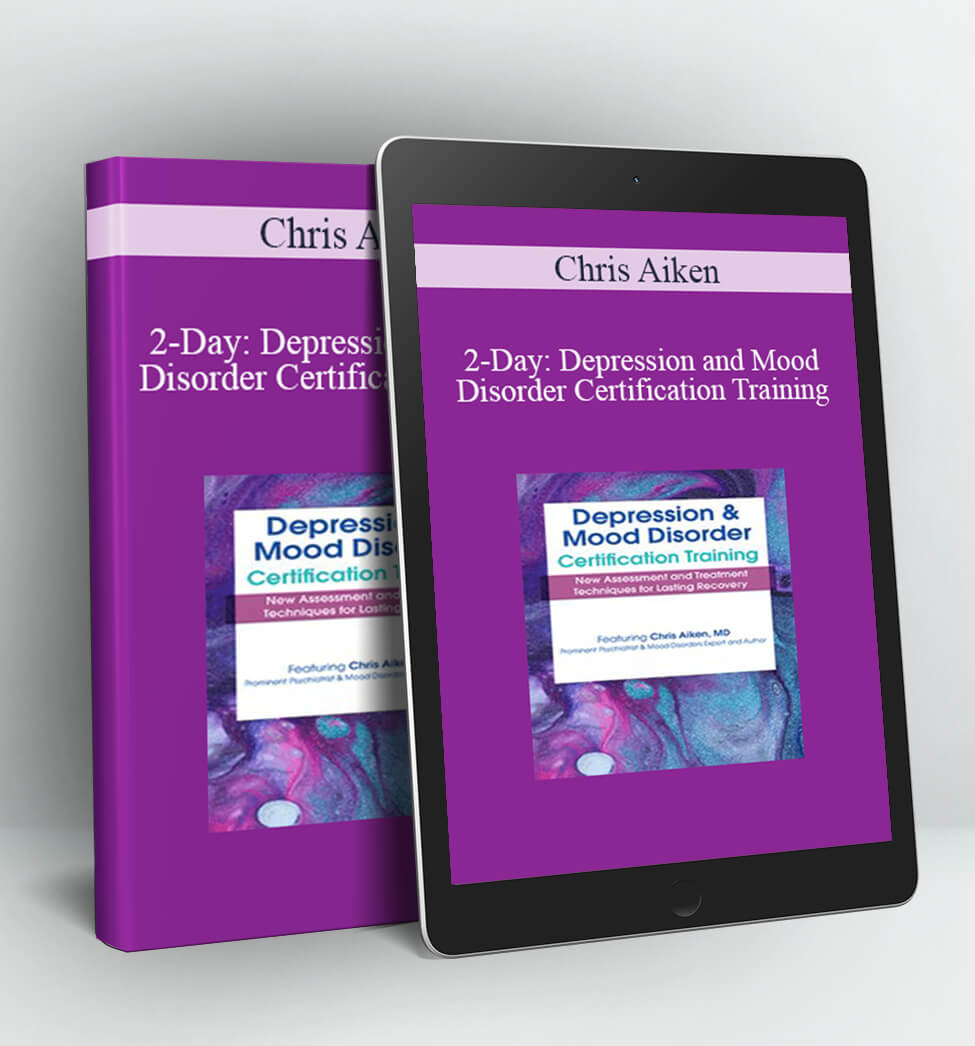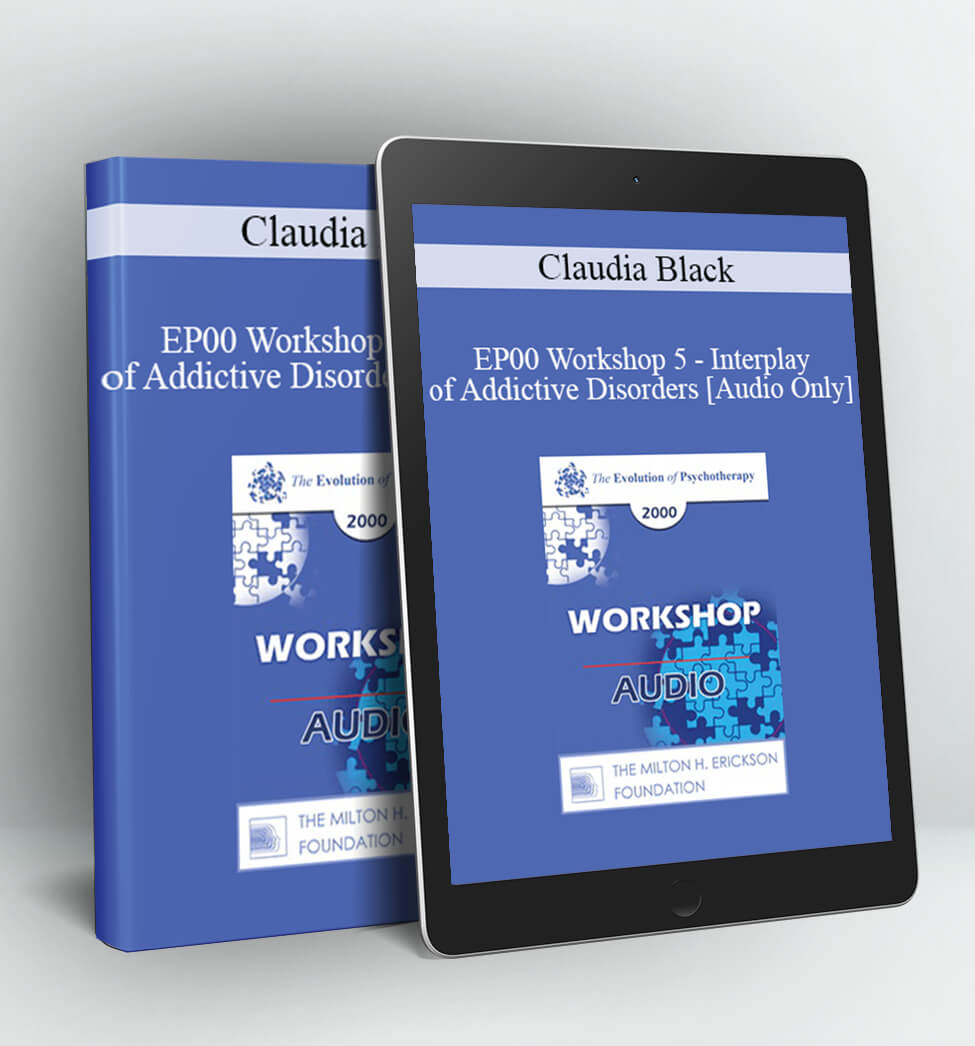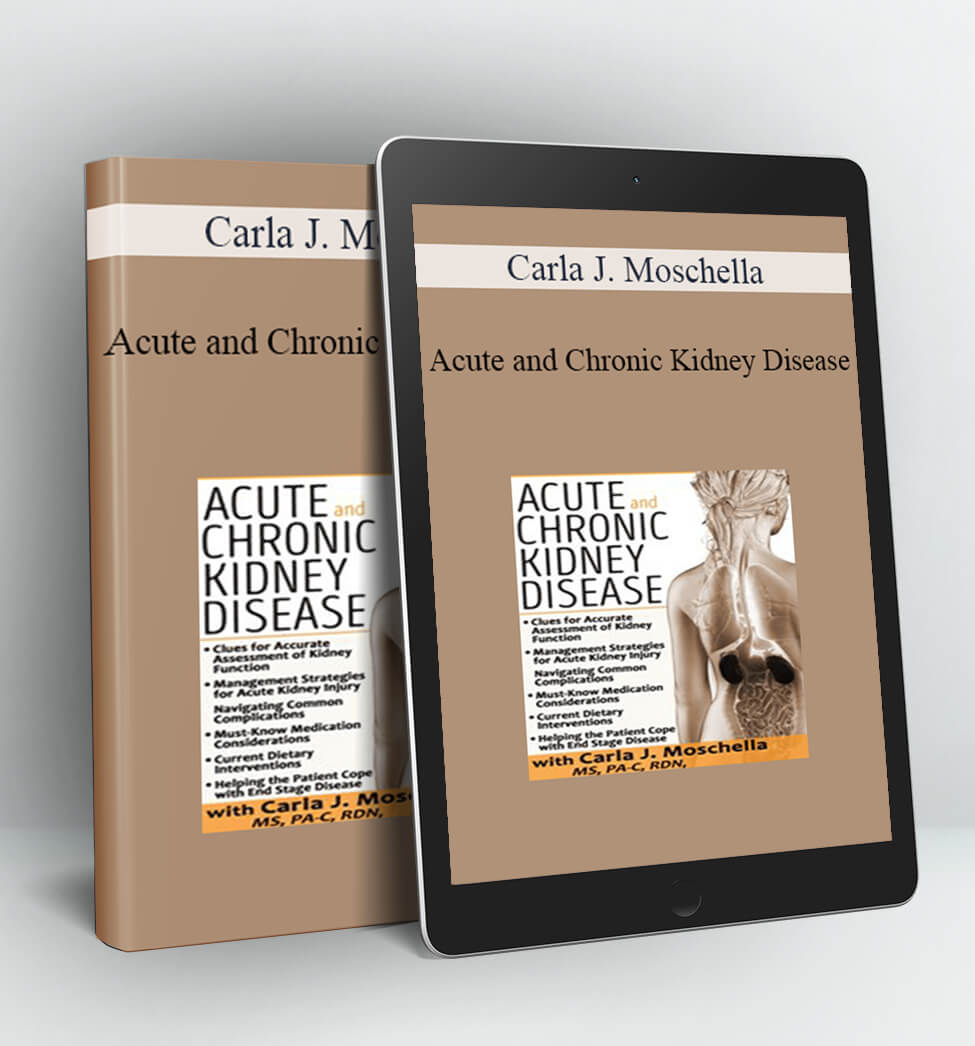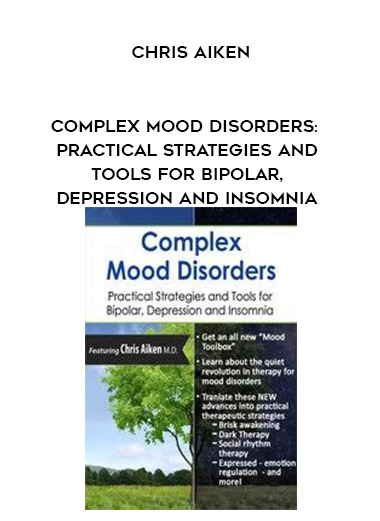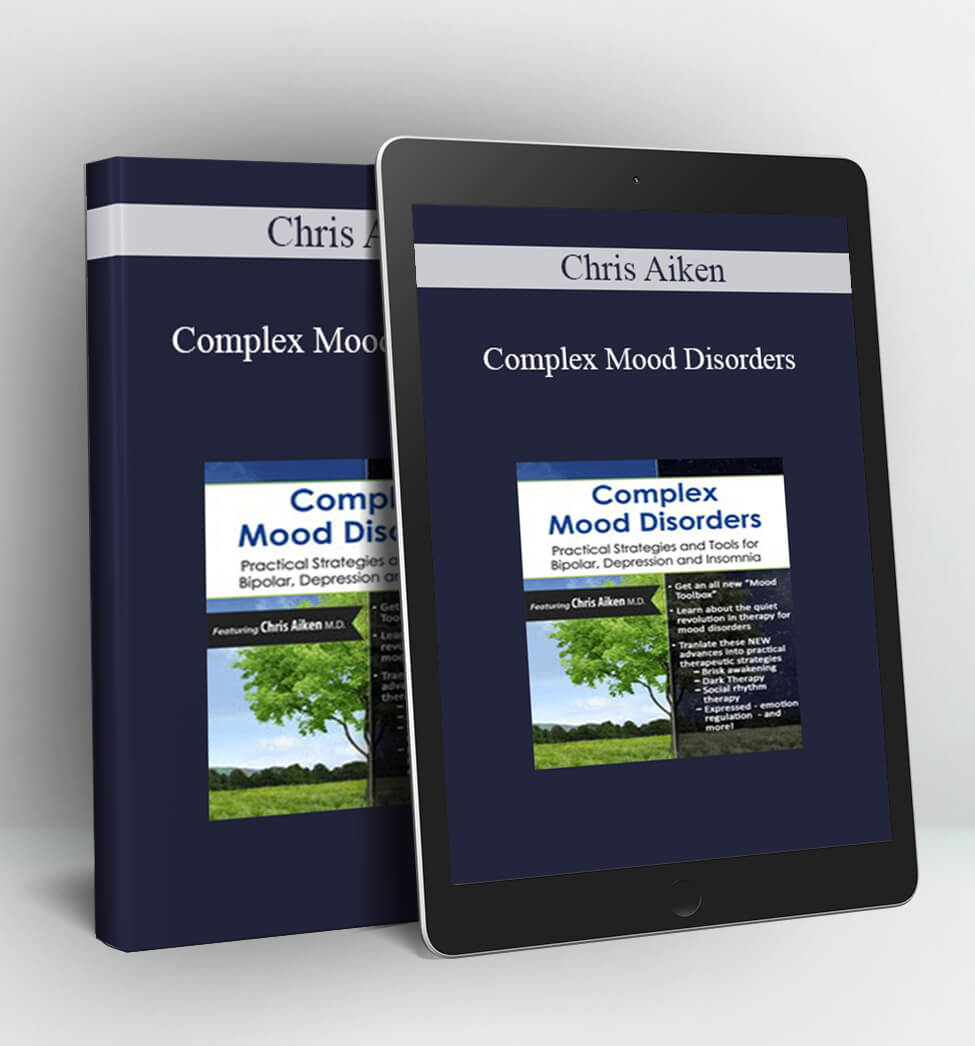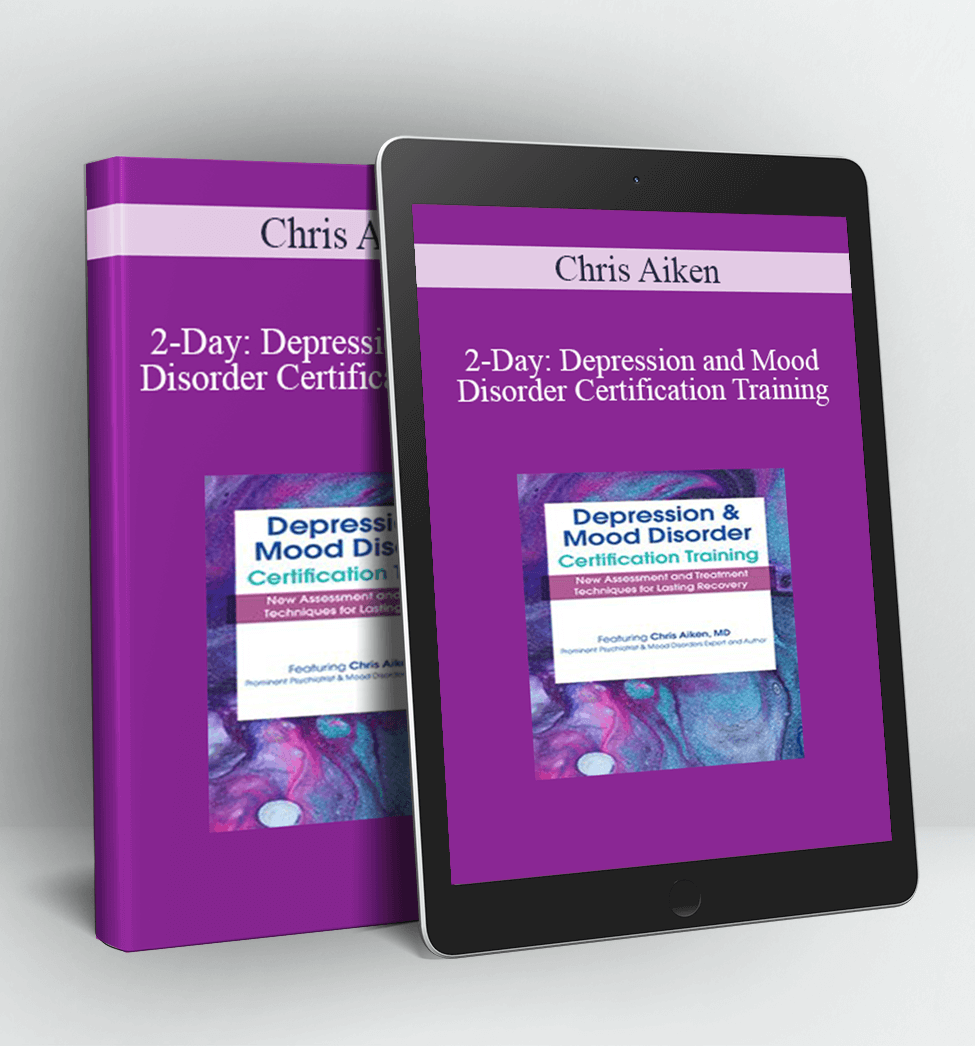2-Day: Depression and Mood Disorder Certification Training – Chris Aiken
- Faculty:
- Chris Aiken
- Duration:
- 14 Hours 49 Minutes
- Format:
- Audio and Video
- Copyright:
- Dec 15, 2020
Description
Your clients with depression, bipolar, and other mood disorders are counting on you. But successful treatment can feel like an impossible task.
Diagnosis is tricky, first-line treatments often fail, poor treatment compliance and destructive impulsivity feel like the norm, and recurrence seems the rule and not the exception. And you frequently need to work around medication use that comes with serious side effects, but often fails to offer real benefits. The litany of challenges can leave you feeling exhausted, ineffective, and troubled about the potentially devastating outcomes of treatment failure.
This training is exactly what you need to help your clients achieve a fuller recovery from depression and bipolar disorder, all without resorting to potentially risky and ineffective medication use.
Watch depression and mood disorder expert and author Chris Aiken, MD, and get cutting-edge therapeutic techniques, skills, and practical guidance so you can assess for and effectively treat mood disorders better than ever before. Attend and discover:
- New assessment tools for your practice – demystify the DSM-5™ for mood disorders
- The latest psychotherapy techniques including Rumination-Focused CBT, Social Rhythm Therapy and CBT for Insomnia
- Nutritional psychiatry and the first clinically proven diet to treat depression
Best of all, upon completion of this live training, you’ll be eligible to become a Certified Depression & Mood Disorders Treatment Professional (CDMDTP) through Evergreen Certifications.
Certification lets colleagues, employers, and clients know that you’ve invested the extra time and effort necessary to understand the complexities of treating depression and other mood disorders in clients. Professional standards apply. Visit www.evergreencertifications.com/CDMDTP for details.
Purchase today and leave confident that your treatment toolbox has the right combination of clinical interventions so your clients can find relief and live the lives they deserve!
Handouts
| Extra Handouts – 2-Day Depression & Mood Disorder Certification Training (3.2 MB) | 33 Pages | Available after Purchase | |
| Manual Day 1 – 2-Day Depression & Mood Disorder Certification Training (26.2 MB) | 110 Pages | Available after Purchase | |
| Manual Day 1 with slide notes – 2-Day Depression & Mood Disorder Certification Training (73.5 MB) | 212 Pages | Available after Purchase | |
| Manual Day 2 with slide notes-2-Day Depression & Mood Disorder Certification Training (16 MB) | 285 Pages | Available after Purchase |
Outline
The Mood Spectrum: Diagnosis in the DSM-5™ Era
- Major Depressive Disorder
- Persistent Depressive Disorder
- Depression with Mixed Features
- Cyclothymic Disorder
- Bipolar II Disorder
- Bipolar I Disorder
- Specifiers: Anxious distress, melancholic, atypical, seasonal & peripartum moods
- Mania, hypomania, mixed states: How to recognize each
- Differential diagnosis: Anxiety, addiction, ADHD, eating disorders, substance abuse
- Bipolar Disorder or Borderline Personality Disorder?
Assessment: Practical Tips, Evidence-Based Tools, and Subclinical Features
- How to avoid over-diagnosing
- Evidence-based measures: MINI-7; PHQ-9, MDQ, Bipolarity Index, & Hypomania Checklist
- Why traditional mood charting doesn’t work – and what to do instead
- Affective temperaments: Depressive, Hyperthymic, Cyclothymic and Irritable
- Rumination, cognitive deficits, and early warning signs
- Conceptualizing mood through the lens of energy, not emotion
- Classic v. atypical Bipolar Disorder
- When mood is shaped by trauma
THERAPY FOR MOOD DISORDERS: FROM EVIDENCE-BASED TREATMENTS TO A PERSONALIZED PLAN
Mood Disorder Must-Haves for Every Treatment Plan
- Psychoeducation – reduce stigma, identify causes, focus on prevention
- Psychotherapy – how to match mood with the approach
- Concrete interventions – create a “menu” the client can choose from
- Positive psychology: the unique strengths of mood disorders
- Family therapy – communication skills, boundaries, crisis plans
- Remediation strategies for building back cognitive skills deficits
Behavioral Activation: More Than Building a Busy Schedule
- Neuroscience: Turning down the brain’s default mood network
- Integrating values and meaning in behavioral change
- How behavior challenges depressive beliefs
- Strategies: Opposite action, approach-avoidance, mindful media
Rumination-Focused CBT (RF-CBT)
- How is RF-CBT different from traditional CBT?
- Useful v. dysfunctional rumination
- The benefits of rumination
- Shift from avoidant rumination to absorbing action
- The neurobiological basis of RF-CBT
- Strategies: Chain analysis, habit changing, immersion, mindfulness and compassionate thought
Cognitive Behavioral Analysis System of Psychotherapy (CBASP)
- An attachment-based approach to treating mood disorders
- Preoperational thinking: Why chronic depression is slow to change
- Positive and negative reinforcement in chronic depression
- Evidence to support CBASP for chronic depression
- Strategies: Interpersonal inventory, situational analysis, interpersonal discrimination
Social Rhythm Therapy
- Therapy with a biological basis
- Four routines that stabilize the biological clock
- Circadian rhythms, neurohormones and neuroplasticity
- Strategies: Brisk awakening, zeitgebers, social rhythm chart
Cognitive Behavioral Therapy for Insomnia
- How a therapy for sleep treats depression
- Sleep drive and circadian rhythms
- The vicious cycle of anxiety and insomnia
- Basic steps: Sleep hygiene
- Advanced moves: Bed restriction
- Special situations: Screen time, jet-lag, napping, night owls, and shift work
An Antidepressant Lifestyle
- Nutrition: The MediMod Diet, probiotics, caffeine, alcohol and sugar
- Physical Activity: When, where, how much
- Environment: Dawn simulation, light and dark therapies, nature, music, aromatherapy and air ionization
Medication
- Why a clear diagnosis is crucial before starting any medication
- Anti-depressants and mood stabilizers: New classes, old standards
- Benefits, risks, side effects; how to recognize problems
- How medication impacts therapy: State-dependent learning
- The Medication Interest Model: A Motivational Interview for Medication Adherence
- Top supplements for mood disorder
- Beyond medication: Transcranial Magnetic Stimulation, Electroconvulsive Therapy, esKatamine
Crisis Intervention
- The therapeutic relationship with the suicidal client
- A collaborative approach to risk assessment
- Which symptoms warrant hospitalization?
- CBT for Suicidality: How therapy can present suicide
- Strategies: Hope box, coping cards, and distress tolerance skills
- Emergency planning
Clinical Considerations
- Countertransference issues in depression and mania
- Staying within your scope of practice
- Children and adolescents: DMDD v. Bipolar Disorder
- Multicultural considerations
Faculty
Chris Aiken, M.D. Related seminars and products: 2
Chris Aiken, M.D., is a psychiatrist who specializes in natural and behavioral approaches to mood disorders. He is the editor-in-chief of the Carlat Psychiatry Report, section editor for Psychiatric Times, and the host of The Natural Mind podcast. His books include Bipolar, Not So Much, The Depression and Bipolar Workbook, and Drug Metabolism in Psychiatry. His work has been cited in the International Encyclopedia of Depression, and he is involved in clinical research to identify new treatments for mood disorders. He maintains a private practice through the Mood Treatment Center and teaches at the Wake Forest University School of Medicine.
Speaker Disclosures:
Financial: Chris Aiken is director and founder of Mood Treatment Center. He receives royalties as an author for WW Norton; and PESI Publishing & Media. Dr. Aiken receives a speaking honorarium from PESI, Inc.
Nonfinancial: Chris Aiken is a Distinguished Fellow of the American Psychiatric Association. He is a member of the North Carolina Psychiatric Association; Forsyth County Psychiatric Association; and the International Society for Bipolar Disorders.
Access Download 2-Day: Depression and Mood Disorder Certification Training – Chris Aiken right now!
Delivery Method:
After your purchase, you’ll get access to the downloads page. Here, you can download all the files associated with your order.
Downloads are available once your payment is confirmed, we’ll also send you a download notification email separate from any transaction notification emails you receive from Vinlearn.

